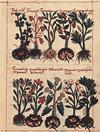- herbal
-
/err"beuhl, herr"-/, adj.1. of, pertaining to, or consisting of herbs.n.2. a book about herbs or plants, usually describing their medicinal values.3. a herbarium.[1510-20; < ML herbalis of, belonging to grass or herbs. See HERB, -AL1]
* * *
Ancient manual of plants used for medicinal purposes.Hundreds or thousands of medicinal plants were known in ancient India, China, and Greece and medieval Europe. In the late 16th century, European herbals began to include plants from the Western Hemisphere. Their accuracy varies widely, but many of the plants in herbals later became sources for drugs (e.g., digitalis). Watercolour illustration from the Badianus Manuscript, an Aztec herbal in Latin by Juan ...By courtesy of the Vatican Library, Vatican City
Watercolour illustration from the Badianus Manuscript, an Aztec herbal in Latin by Juan ...By courtesy of the Vatican Library, Vatican City* * *
▪ manualancient manual facilitating the identification of plants for medicinal purposes. Hundreds of medicinal plants were known in India before the Christian era, and the Chinese have a compilation, still authoritative, of 1,892 ancient herbal remedies. The Greeks had written accounts, and, according to the elder Pliny (Pliny the Elder), the physician Crateuas (early 1st century BC) produced a herbal with coloured illustrations. This has not survived but was probably largely embodied in the De materia medica of the Greek physician Pedacius Dioscorides. A Byzantine version of his famous herbal is the Constantinopolitan, or Viennese, Codex (c. AD 512). Some of its illustrations are probably derived from Crateuas, together with plant names, such as Anemone and Anagallis, which are still in use. Many manuscript herbals, drawing largely from Dioscorides and Pliny, were published in medieval Europe; during the 15th century several were printed, a notable one being Konrad von Megenberg's Das puch der natur (or Buch der natur, “Book of Nature”). When printed in 1475, it included the first known woodcuts for botanical illustrations. Very few original drawings were prepared for herbals before the 16th century: illustrations were copies and copies of copies. They became highly stylized, not only ceasing to resemble the plants depicted but also incorporating mythological notions. “Narcissus,” for example, in Jacob Meidenbach's Hortus sanitatis (1491), is unidentifiable: a human figure, instead of the plant's sex organs, emerges from each perianth (sepals and petals of a flower).Otto Brunfels' (Brunfels, Otto) Herbarium vivae eicones (1530s) contains excellent and accurate drawings by the wood engraver Hans Weiditz. This emphasis on accuracy also appeared in the subsequent herbals of Hieronymus Bock and Leonhard Fuchs. Plants brought back by explorers then began to be illustrated. Nicolás Monardes' Dos libros (1569), for example, contains the first published illustration of tobacco. A latinized version of an Aztec herbal (1552) contains formalized illustrations resembling European ones, suggesting that the artists were following the traditions of their Spanish masters rather than an indigenous style of drawing. Among other well-known herbalists of those times were John Gerard, Conrad Gesner, and Gaspard Bauhin.Alongside the genuine herbals other works of a superstitious nature probably existed. Many were concerned with the fanciful medical theory of the doctrine of signatures, the use of plants to cure human ailments on the basis of supposed anatomical resemblances. In England these culminated in Nicholas Culpeper's A Physicall Directory (1649), which was a pseudoscientific pharmacopoeia. The herbals were replaced in the 17th-century by floras, books in which plants were studied for their own sake.* * *
Universalium. 2010.
